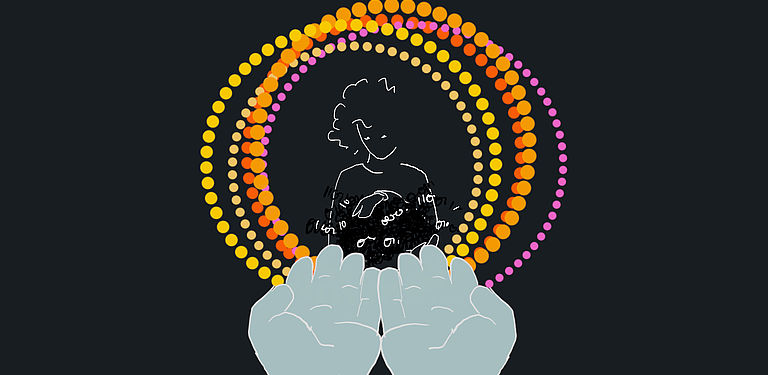Modern technologies are capable of analysing substantial volumes of data at high speed. Patterns can be identified in big data, relationships can be extrapolated and new insights can be gained. Data are what new business models are built on. Data can also be harnessed to promote general welfare. Take mobility data for instance, which can be used to optimise the flow of traffic, and health data, which can be used to improve the way we treat diseases.
For data to actually become available, we, as citizens, need to be willing to share ours. We take many such disclosure decisions every day. For example, when we use an app, when we shop online or when we accept the cookie banner on websites. But what influences our willingness to share data? What role do the legal system and cultural factors play?
Playing the video will send your IP address to an external server.
"Data ecosystems worldwide are fuelled by data, especially personal data. A prerequisite is the disclosure of personal data," says legal expert Professor Moritz Hennemann in the video explaining the bidt project "Vectors of data disclosure". "In our project, we analyse the regulatory and cultural settings determining this process."
The team takes a comparative, interdisciplinary approach: at the University of Passau, it combines cultural studies and information systems research with the jurisprudential perspective. The project is funded by the Bavarian Research Institute for Digital Transformation (bidt) in Munich. Alongside Professor Hennemann (Chair of European and International Information and Data Law), the group includes Professor Kai von Lewinski (Chair of Public Law, Media Law and Information Law), Professor Daniela Wawra (Chair of English Language and Culture) and Professor Thomas Widjaja (Chair of Business Information Systems).
The project team is interdisciplinary, and the research topic is international: The team has selected countries from around the world in which it will monitor data disclosure in various cultural dimensions. Aside from Germany in the European Union and Switzerland as a non-EU country, they include the US as well as Brazil, China, Ghana, Japan and Russia. "In a digitalised world such as the world of data protection, the problem is ubiquitous. But regulation is still local. However, you cannot solve legal problems if the solution layer is smaller than the problem layer," says legal expert Professor Kai von Lewinski.
Just recently, the team presented its preliminary results at a bidt conference in Munich. One of its findings in the legal sub-project was that the EU's General Data Protection Regulation is readily dubbed the gold standard in theory but collides with various cultural realities in actual practice. "Besides the cultural context, there are other factors that influence whether people are willing to disclose their data in very specific situations," says Professor Daniela Wawra who heads the cultural sub-project. Questions of benefit and risk play a role, as do questions of trust.
Focus in the third year of funding: country-specific data protection rights
The project team is now having a closer look at precisely this abstract sense of trust: "What we observe is that even when people are unable to say in any specific terms what data protection actually is, they have a rather abstract feeling. In our project, we are trying to understand, among other things, how this abstract sense influences data disclosure decisions," explains Professor Widjaja. Ultimately, this is key also for new business models.
The project has been running since January 2021. Following a successful evaluation, it is now moving into its third year of funding. The focus will be on country-specific data protection rights. The project researchers want to find out what part these rights play in the disclosure decision. For this purpose, the research team will again be interviewing citizens as well as data protection experts. In addition, the legal experts involved will be analysing and categorising existing regulatory tools based on the country reports previously drawn up in the project.
Illustrations: Isabel Groll
Participating researchers
Professor Moritz Hennemann
Which regulatory models for digital interaction should we be following in the 21st century?
Which regulatory models for digital interaction should we be following in the 21st century?
Professor Moritz Hennemann has held the Chair of European and International Information and Data Law and headed the Research Centre for Law and Digitalisation (FREDI) of the Faculty of Law at the University of Passau since 2020. His research revolves around the global development of data and data protection law as well as the legal and regulatory framework of the digital economy.
Professor Kai von Lewinski
What does the internet mean for geographically limited legal systems?
What does the internet mean for geographically limited legal systems?
Professor Daniela Wawra
How do culture and language shape analogue and digital interactions?
How do culture and language shape analogue and digital interactions?
Professor Daniela Wawra has held the Chair of English Language and Culture of the Faculty of Arts and Humanities since 2010. From 2018 to 2020 she was Vice President for Study, Teaching and Internationalisation at the University of Passau.
Professor Thomas Widjaja
What changes when companies develop new services using customer data?
What changes when companies develop new services using customer data?
Professor Thomas Widjaja has held the Chair of Business Information Systems since 2016. He is also one of the principal investigators of the DFG Research Training Group 2720. Previously, he gained his doctoral and postdoctoral degrees at TU Darmstadt.
bidt-project "Vectors of Data Disclosure"
To what extent does our cultural background and the legal environment affect how willing we are to disclose our personal data? Does it for example make a difference if the data is transferred to another country—a common feature of many transactions?









